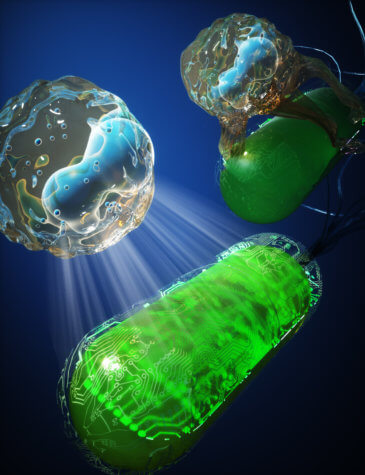
NEW YORK — An “invisibility cloak” for cancer drugs could be the new secret weapon that kills life-threatening tumors. Engineering researchers from Columbia University say this invention hides good bacteria from the immune system, enabling these substances to reach tumors undetected.
The masked probiotic could revolutionize cancer therapy. In experiments, it wiped out diseased cells in mice. Study authors hope this technique will work even better in humans, who are 250 times more sensitive to bacteria.
“What’s really exciting about this work is that we are able to dynamically control the system,” says biomedical engineer Professor Tal Danino in a university release. “We can regulate the time that bacteria survive in human blood, and increase the maximum tolerable dose of bacteria. We also showed our system opens up a new bacteria delivery strategy in which we can inject bacteria to one accessible tumor, and have them controllably migrate to distal tumors such as metastases, cancer cells that spread to other parts of the body.”
Hijacking bacteria coatings
Infection-fighting T cells sometimes fail to distinguish friend from foe. The genetically engineered “microbial encapsulation system” solves this. In nature, bugs protect themselves from attack with a coating of sugary polymers known as capsular polysaccharides, or CAP.
“We’ve shown proof of concept in mouse models, but given that humans are 250 times more sensitive to bacterial endotoxins than mice, we expect our results may have an even bigger effect on human patients than on mice,” says PhD student and co-lead author Tetsuhiro Harimoto.
“We hijacked the CAP system of a probiotic E. coli strain Nissle 1917,” Harimoto continues. “With CAP, these bacteria can temporarily evade immune attack; without CAP, they lose their encapsulation protection and can be cleared out in the body. So we decided to try to build an effective on/off switch.”

Using bacteria to fight cancer is a tricky balancing act
Scientists named their invisibility cloak iCAP (inducible CAP). It tweaks the structure with a protein called IPTG that programs and alters the E. coli cell surface. The Columbia team changed how long it survived in human blood, by tuning amounts of the small molecule.
Bacteria-based immunotherapy is a growing area of interest in cancer research, with researchers exploring a wave of different techniques to treat patients. However, this alternative approach faces a number of challenges. Unlike traditional drugs, bacteria are living organisms and can proliferate within the body.
The body’s immune system also detects bacteria and considers it both foreign and dangerous, triggering a high inflammatory response. Too much bacteria in the body leads to high toxicity due to over-inflammation or rapid bacteria elimination. Too little means the therapy won’t be effective.
“In clinical trials, these toxicities have been shown to be the critical problem, limiting the amount we can dose bacteria and compromising efficacy. Some trials had to be terminated due to severe toxicity,” reports Dr. Jaeseung Hahn.
The cloak allows for more bacteria tolerance
The mouse tumor models showed iCAP increased the maximum tolerable dose ten-fold thanks to the bacteria dodging immune cells. Over time, the invisibility cloak disappeared meaning the bacteria was eliminated in other parts of the body without side-effects. In further tests, study authors engineered the system to produce an anti-tumor drug.
Colon and breast cancers shrank significantly more in lab rodents compared to a control group. There are more than 80 different types of CAP that exist just for E. coli and even more for other bacteria species that scientists could engineer using similar approaches. Moreover, CAP is not the only molecule that bacteria have on their surface. Other molecules could be controlled in a similar fashion. Additionally, other control systems such as biosensors could help to autonomously control surface properties of therapeutic bacteria.
“While there is a good deal of laboratory research showing various ways to engineer microbes, it is very difficult to apply these powerful therapies to a complex animal or human body,” Harimoto says.
“Bacterial cancer therapy holds unique advantages over conventional drug therapy, such as efficient targeting of the tumor tissue and programmable drug release. Potential toxicity has been limiting its full potential. The cloaking approach presented in this study may address this critical issue,” adds Professor Kam Leong.
The study is published in the journal Nature Biotechnology.
South West News Service writer Mark Waghorn contributed to this report.
